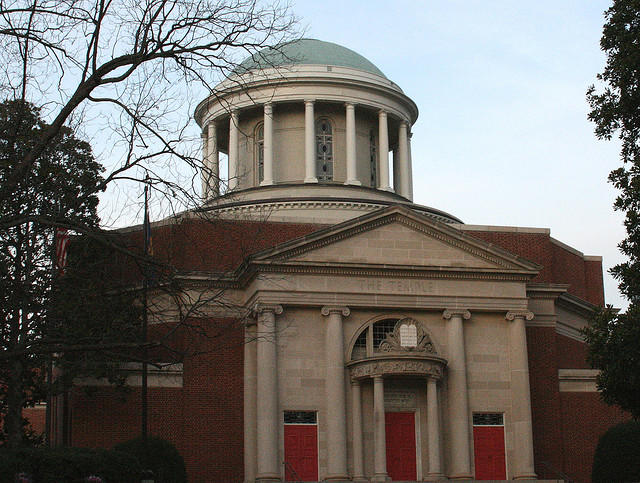
Section Branding
Header Content
The Temple Bombing
Primary Content

Join GPB in person or via live chat and livestream tonight for a panel discussion about the Temple bombing, featuring Janice Rothschild Blumberg. Here is how to take part.
This post gives context to that bombing. It explains what happened and how Rabbi Jacob Rothschild was integral in healing the city of Atlanta.
Atlanta is home to two of the most infamous cases of anti-Semitism in American history.
The first case culminated in an angry mob lynching Leo Frank and the second culminated in the bombing of the synagogue of Atlanta’s oldest Jewish congregation, the Temple.
Both of these events took place in the 20th century, but each event fostered different reactions from the greater Atlanta community. While the lynching of Leo Frank led to Georgians boycotting Jewish stores and running the governor out of town, the Temple Bombing led to an outpouring of support for the Jewish community in Atlanta.
For this reason, Janice Rothschild Blumberg, widow of the late Rabbi Jacob Rothschild, proclaimed the act of hatred as “The bomb that healed.”
Rabbi Jacob Rothschild
Jacob Rothschild was born in Pittsburgh, Pennsylvania, in 1911. His rabbi growing up, Samuel Goldenson, was an outspoken member of the community and an activist against the mistreatment of workers in the city’s booming steel mill industry.
Inspired by Rabbi Goldenson's example, Rothschild decided to pursue a career in rabbinical studies and became an ordained rabbi in 1936. After serving in World War II as an army chaplain, Rabbi Rothschild accepted the pulpit at Atlanta’s oldest Jewish congregation, the Hebrew Benevolent Society, or better known as simply, The Temple
Civil Rights
When Rabbi Rothschild first arrived in Atlanta in 1946, he was stunned by the level of discrimination. Like many northerners, he was unaccustomed to segregation and the harsh realities of Jim Crow laws.
At first, Rabbi Rothschild only subtly supported Civil Rights as he was afraid to upset the status quo. The aftermath of the lynching of Leo Frank was still very much present as Frank was a member of The Temple and much of the congregation remembered the dark days that surrounded the lynching.
It wasn’t until the United States Supreme Court issued its Brown vs. the Board of Education decision, which called for an end to segregation that Rabbi Rothschild began to preach openly about his views on Civil Rights.
The Bombing
Civil Rights increasingly became a recurring theme in Rabbi Rothschild’s sermons and the congregation began to grow comfortable and support his views. Unfortunately, Rabbi Rothschild’s outward stance on a sensitive subject made his beautiful synagogue a target for hate.
On Sunday, October 12th, 1958, fifty sticks of dynamite exploded on the side wall of the Temple. Luckily, it occurred in the middle of the night while the building was vacant. If the bomb had detonated a few hours later during Sunday school or during the wedding that was scheduled that morning, it could have had a lot worse results.
Aftermath
The Jewish community feared the bombing would spur another wave of anti-Semitism similar to what occurred following the lynching of Leo Frank. Especially after the “not guilty” verdict was issued to George Bright, a member of the hate group the National States Rights Party and lead suspect in the case, the Jewish community felt like justice had not been served.
The outpouring of support for the Temple from the citizens of Atlanta, however, did heal old wounds. Atlanta’s business, political, and social elites did not act with indifference but rather denounced the bombing and set out to raise funds to repair the building.
Through this support, along with the leadership of Rabbi Rothschild, the congregation refused to let fear control them and members became more outspoken in support of Civil Rights. Many of the congregation’s members, along with Rabbi Rothschild, helped organize a dinner to honor Martin Luther King Jr. for being Georgia’s first Nobel Peace Prize recipient.
Georgia’s Jewish Community
Although Georgia is home to two of the country’s most infamous cases of anti-Semitism, it has also been a place where Jews have thrived and succeeded in business, politics, and family life. Atlanta has grown alongside the Jewish community and vice versa. Despite the lynching of Leo Frank and the Temple Bombing, we cannot forget the many contributions Jews have made to this city such as helping to start Grady Hospital and Georgia Tech, or Rich’s department store paying public employees during the Great Depression when the state did not have the means.
To this day, the Jewish community remains an integral part of the greater Atlanta community. The Temple Bombing did not produce the effects the perpetrators intended. It only brought a community together that was in need of strengthening.
For more information on this event and more, please visit the Breman Museum.





